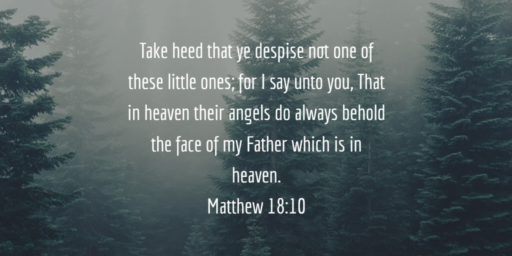Matthew 18:10 | Is it talking about guardian angels?
Categories: Bible Questions and Answers Tags: Bible Lessons on Guardian Angels
In Matthew 18:10, we read, “Take heed that ye despise not one of these little ones; for I say unto you, That in heaven their angels do always behold the face of my Father which is in heaven.” What does “that in heaven their (the child’s) angels do always behold the face of my Father which is in heaven” mean? Please explain this verse.
The Context of Matthew 18:10 Explained
In this context, Jesus is addressing the disciples regarding their question of who is the greatest. Jesus answers their question in saying that the one who is like this little child is the greatest. He goes further to speak of what he means by the character of the little child in verses 3-5. He says 1) to enter the kingdom one must convert and become as a little child, 2) the one who humbles himself as a child is humble is the greatest in the kingdom, 3) to receive a little child is to receive Jesus. He has thus far spoken of positive behavior as related to the little children. In verses 6-10 he now discusses negative behavior toward these children. He says 1) the one who offends one of these little ones is in a lost condition, 2) those who commit offenses are in a condition of woe, 3) we should cut off occasions of offense from ourselves lest we fall. Then Jesus sums up both the negative and positive in Matthew 18:10. Great care should be given not to despise the little ones on account of their status with God. What is that status? Their angels are always before the face of God. How does this fit in with the context?
First, Jesus praises the character of the little child. Second, Jesus condemns the character of the one who causes offense toward the little child. On the one hand, you have the innocent. On the other hand, you have the guilty. The phrase “their angels do always behold the face of my Father” must refer to the innocence of the child. But this begs some additional explanation.
In Hebrews 1:14, we see that angels are “ministering spirits.” And that they minister to those who will inherit salvation. What are their responsibilities in this regard? What are their duties? We just do not know all of the things that they do. However, we do get a glimpse of it in a few passages. In Genesis 28:10 we read about a dream that Jacob had. This dream showed a ladder. Upon that ladder, the angels of God were ascending and descending upon it. So God’s angels go up to heaven and come down to earth in their service to Him. In what way would an angel be of service to God?
The Greek word for angel (like we find in Matthew 18:10) is “angelos” and it literally means “a messenger.” The translators of the Bible thought that there was a special being that God called a messenger, so they transliterated the word “angelos” into our English word, “angel.” Having this in mind, let’s look at Revelation 8:3-4. In this context we see an angel mixing incense with the prayers of the saints. It is a context of worship before God. Given that angels are “messengers” and given that they are to minister to the saints going back and forth from earth to heaven, and given that they appear before God in the context of worship, it may be that they in some capacity serve to carry the prayers or worship of the saints before the throne of God. This is my opinion and I could be entirely wrong about this. But this fits well with the idea of a child’s angel always being before the face of the Father. That is, the child has no sin; there is no need for the child to pray for forgiveness of sins; so there is no need for their messenger to go back and forth from the earth to heaven to carry the messages of the child to God. Therefore, they are always before the face of the Father in that they are not going back and forth to the earth to carry these messages. Again, this is just my opinion as to what I think it means.
Does it Mean a Guardian Angel?
Some cite this passage and say that each child has a “guardian” angel. The passage does NOT teach this. In fact, it teaches just the opposite. If the angel is always before the face of the Father, then it cannot be following the child around making sure that it doesn’t get hurt or anything like that. A child’s guardians are his parents and when parents fail to raise their children appropriately, children get hurt.
So to conclude, we can definitely say that whatever this means, Matthew 18:10 speaks to the innocence of the child. On that, there is no doubt. As to the way God uses angels in the world today, there is just too much that we don’t know and I know of no better explanation for the meaning of this passage than the one I have given.